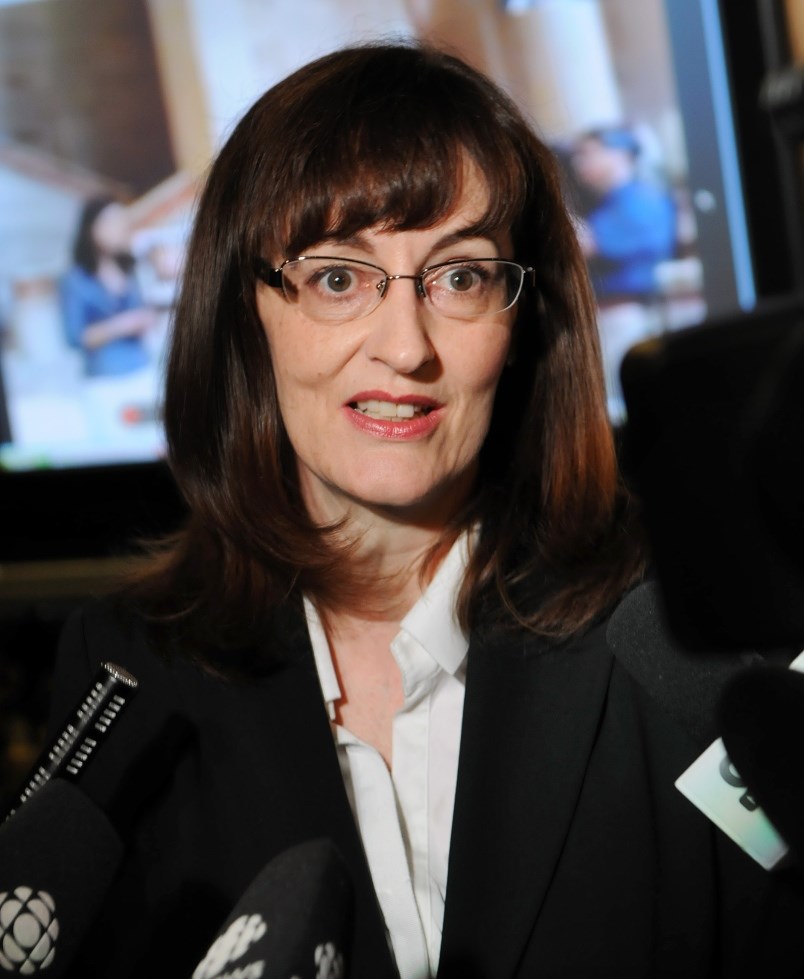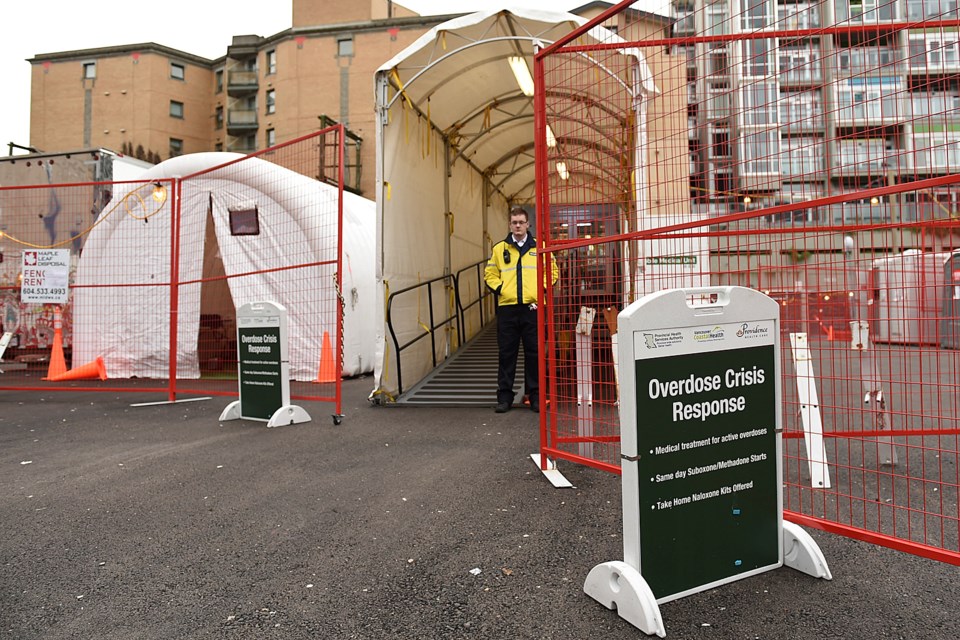A mobile emergency medical unit set up in the Downtown Eastside in December to help handle the high volume of drug overdoses in the community will scale back its services Monday and will no longer provide doctors on site or serve as a drop-off spot for ambulances.
Paramedics will instead transport patients to hospitals or recently opened clinics such as Connections on Powell Street and the Rapid Access Addiction Clinic at St. Paul’s Hospital, which provide treatment and addictions services and are showing an uptick in patients seeking therapy.
“We want to make sure that people don’t think now that because we’re transitioning the services that their lives don’t matter,” said Dr. Patricia Daly, the chief medical health officer for Vancouver Coastal Health, regarding the medical unit at 58 West Hastings. “The message is, we’re opening up permanent services and we want to start utilizing those. We never intended the [mobile medical unit] would be there permanently. But I want to emphasize that we don’t think the crisis is over.”
The decision by the health authority comes as the city released statistics Thursday that show 100 people died in Vancouver this year of an overdose, a concerning statistic for Mayor Gregor Robertson who noted a total of 215 people died in all of 2016. As well, Vancouver and Fire Rescue Services responded to 162 overdose calls for the week of March 20, a 56 per cent increase over the previous week.
“It’s abominable that with 100 overdose deaths already this year in Vancouver – almost half of 2016’s total – we have yet to see effective action from the provincial and federal governments on health care solutions that will stop the death toll in this fentanyl crisis,” the mayor said in a statement Thursday.
Daly said the medical unit will still operate at least until May, with a nurse and outreach staff available to respond to or redirect any walk-in patients requiring treatment. The unit could scale back up as an emergency facility with doctors, if the crisis escalates, she added.

“We want to ensure that we’ve got several weeks of this new model, and if things get worse, we can always re-activate the services,” she said, noting the Connections clinic at 623 Powell St. that opened earlier this month provides an enhanced version of the medical unit.
Connections is a short walk from the site of the medical unit. It will be the first clinic that Daly can think of that will accept patients via an ambulance. She emphasized more serious cases of overdoses – where patients haven’t been revived -- will be transported directly to hospital.
70 patients enroled at new clinic
She said the clinic, which is staffed with doctors, nurses, pharmacists and former drug users who act as peers, offers opioid replacement therapy, including methadone and Suboxone. No appointment is required for patients, who make daily visits for treatment for an average of three months before being connected to health services that provide longer term care. More than 70 people have enroled since the clinic opened March 1.
The Rapid Access Addiction Clinic at St. Paul’s Hospital opened in September and has seen more than 580 patients and started 140 people on opiate replacement therapies, including methadone and Suboxone.
Though overdose deaths have increased in Vancouver, Daly said the number of visits to the medical unit and the hospital decreased since busier months in January and December. For example, from March 12 to March 18, the medical unit treated 11 overdose patients.
She attributed the decrease to the opening of Connections and the clinic at St. Paul’s, more public injection rooms set up in hotels and drug users’ centres -- including the Overdose Prevention Society’s trailer in the Downtown Eastside -- and the availability of the overdose-reversing drug, naloxone.
Many overdose victims, once revived by emergency personnel or volunteers, have also chosen not to be transported to hospital or the medical unit. Daly noted that on March 22 -- one of the ambulance services’ busiest days responding to overdoses -- that about 40 per cent of patients in Vancouver refused to be transported to a medical facility.
Daly said she understands the mayor’s frustration with the crisis but added that health care experts, emergency personnel and addictions specialists are all working to find solutions to decrease the number of drug deaths.
“I understand the frustration because even people within the health authority say we’ve invested quite a lot of time, effort and services, yet the deaths are going up,” she said. “We actually have some analysis that shows the deaths would have been worse, if we hadn’t put in place these services.”
Daly, along with provincial health officer Dr. Perry Kendall, will present that evidence to Vancouver city council at its April 12 meeting. That evidence will also show the medical unit had 2,500 patient visits and treated 566 overdoses since it opened in December.
“It was very valuable,” she said of the medical unit. “It did relieve the pressure on the emergency and the ambulance. It also helped us understand some very innovative models of care [that not all overdose victims have to be treated at hospital].”
B.C. saw more than 900 drug deaths in 2016. Daly noted up to 90 per cent of the deaths in Vancouver occurred inside, including single-room-occupancy hotels, where a person has injected alone. Daly said she supports the mayor’s call to have all government-owned single-room-occupancy hotels set up injection rooms.
@Howellings



